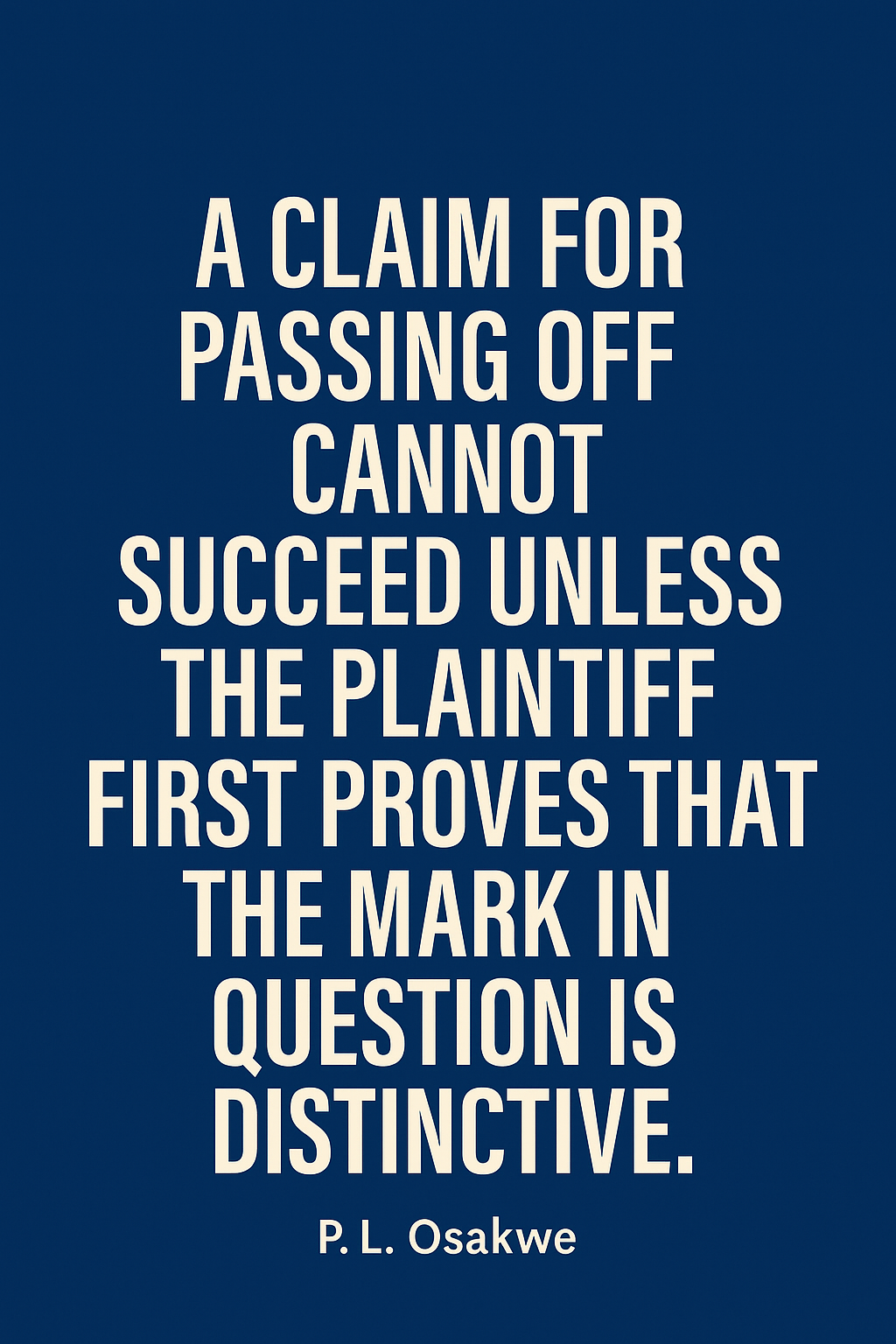By P.L. Osakwe
■ Introduction
In the world of branding, owning a unique trademark is more than just a commercial advantage, it's a legal shield. But what many businesses and even legal practitioners often overlook is that before you can claim your mark has been copied, you must first prove that it is legally yours to protect.
This is where the concept of distinctiveness comes in.
In the landmark Supreme Court decision of Ferodo Ltd & Anor v. Ibeto Industries Ltd (2004) LPELR-1275(SC), the Court laid out a crucial principle:
A claim for passing off cannot succeed unless the plaintiff first proves that the mark in question is distinctive.
Like the number 1 precedes the number 2, distinctiveness must come before any allegation of imitation or brand misrepresentation. This article breaks down the legal reasoning behind this ruling and explains why distinctiveness is the true foundation of trademark protection in Nigeria.
■ Background of the Case
The plaintiffs, Ferodo Ltd, a foreign manufacturer, brought a claim against Ibeto Industries Ltd, alleging passing off of their trademarked product. Ferodo argued that Ibeto had engaged in unfair competition by marketing goods that were visually and commercially similar to theirs, thus likely to mislead the public.
However, the defendant challenged the claim, arguing that Ferodo's mark lacked sufficient legal protection because it was not distinctive enough in the Nigerian market to be protected.
This raised a fundamental legal question:
Can a party succeed in a passing off claim without first proving that their trademark is distinctive?
■ The Supreme Court’s Reasoning
At page 62, paragraphs C–G of the judgment, the Supreme Court answered that question unequivocally:
“An essential element of a device claimed to be a trade mark is that it identifies the goods of a particular merchant and distinguishes them from the goods of others. A word, symbol, shape or colour serving this purpose is said to be distinctive. Certain marks are inherently distinctive while others only acquire distinctiveness over time… A distinctive mark may lose its distinctiveness over time and become generic.”
The Court further emphasized:
“In the law of trademarks, the element of distinctiveness comes before that of passing off in the way the number 1 comes before the number 2. In other words, the Plaintiff must first prove to the satisfaction of the court that the trade mark has a distinctive character or nature, before he can prove the movement of the Trade mark of the Defendant in business circles by way of passing-off.”
This established the legal hierarchy between the concepts of distinctiveness and passing off, placing the former as the foundational requirement in any trademark dispute.
■ What Is Distinctiveness?
Distinctiveness refers to a mark’s ability to identify the source of a product or service and distinguish it from others in the market. It is what transforms a word or symbol into a brand. The Court recognized two categories:
1. Inherently Distinctive Marks
These are marks that are immediately capable of identifying the source of goods (e.g., invented or coined words like Kodak, Xerox, Pepsi).
2. Acquired Distinctiveness (Secondary Meaning)
This occurs when a mark, though originally generic or descriptive, has gained public recognition through consistent and exclusive use over time (e.g., Facebook, Google).
Without one of these forms of distinctiveness, a mark cannot be legally protected, even if it is widely used.
■ Why Distinctiveness Must Come First.
Passing off is a tort of misrepresentation. It protects the goodwill associated with a product from being unfairly used by others. However, you can’t claim that someone is misrepresenting your brand if your brand isn’t distinctive in the first place.
The Supreme Court’s analogy is instructive: just as 1 comes before 2, distinctiveness must be established before the Court can even consider whether the defendant’s actions amount to passing off.
Put differently, you cannot pass off what does not exist. If the public does not associate the mark with a particular source, there is no deception, and therefore no cause of action.
■ Loss of Distinctiveness: When Marks Become Generic.
The Court also recognized that even distinctive marks can lose their legal protection if they become generic over time. This happens when a trademark becomes the common name for a type of product, rather than a specific brand (e.g., "Thermos," "Aspirin," or "Elevator" in some jurisdictions).
Trademark owners must vigilantly protect their brand names to prevent dilution, including educating the public, enforcing exclusive use, and preventing misuse by third parties.
■ Legal Significance of the Case
The Ferodo case remains a guiding authority on trademark litigation in Nigeria for several reasons:
■ It clearly sets distinctiveness as the threshold requirement in any trademark or passing off action.
■ It aligns Nigerian law with global best practices, particularly those followed in the UK, US, and EU jurisdictions.
■ It ensures that only legitimately established commercial identities receive legal protection.
This case also serves as a warning to brand owners: without investing in distinctiveness, through branding, consistent use, and consumer education, you may find yourself unprotected when imitation strikes.
■ Practical Takeaways for Businesses and Lawyers
● Start with Distinctiveness: Choose a mark that is unique and capable of distinguishing your goods from others.
● Document Your Use: Keep records of advertising, sales, packaging, and customer feedback to help prove acquired distinctiveness.
● Don’t Wait: Register your mark early, but also build recognition before relying on the courts for enforcement.
● Guard Against Genericide: Prevent your brand from becoming a victim of its own success by monitoring how it is used in the public domain.
Advise Clients Appropriately: In any passing off case, begin by evaluating whether the mark is truly distinctive in the relevant market.
■ Conclusion
The Supreme Court in Ferodo Ltd v. Ibeto Industries Ltd issued a clear directive: no matter how passionately a business claims that its brand has been copied, the law will not listen until it first proves that its mark is distinctive.
This ruling is not just a legal principle, it is a strategic framework for every business seeking to protect its intellectual property. In the law of trademarks, as in arithmetic, 1 comes before 2. Distinctiveness comes before passing off.

